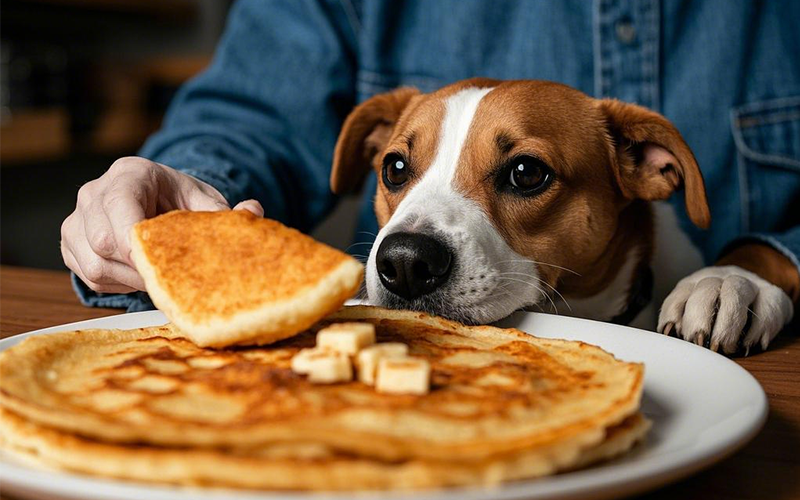Can Dogs Eat Pancakes? A Complete Guide for Dog Owners
- 4 Mar 2025 10:05
Pancakes are a delicious breakfast staple for many people, but can dogs eat pancakes too? The answer is yes, but with caution. While plain pancakes are not toxic to dogs, they don’t offer any real health benefits. Many traditional pancake ingredients, such as sugar, butter, and syrup, can be unhealthy for dogs in large amounts.
In this guide, we’ll explore whether dogs can safely eat pancakes, potential risks, healthier alternatives, and the best way to serve them to your furry friend.

Are Pancakes Safe for Dogs?
Plain pancakes made from basic ingredients (flour, eggs, and water) are not toxic to dogs, but they should only be given in small amounts. However, pancakes with butter, sugar, chocolate, artificial sweeteners, or excessive dairy should be avoided.
Key considerations before giving pancakes to your dog:
No added sugar or artificial sweeteners (especially xylitol, which is toxic to dogs).
No chocolate chips or raisins, as both are highly toxic to dogs.
Limited dairy, as some dogs are lactose intolerant.
Small portions only, to prevent stomach upset and weight gain.
Potential Health Risks of Pancakes for Dogs
While a small bite of plain pancake is unlikely to harm your dog, eating pancakes too often can lead to health problems, including:
❌ Weight Gain and Obesity
Pancakes are high in carbohydrates and calories, which can contribute to unwanted weight gain in dogs. Obesity in dogs can lead to joint problems, diabetes, and heart disease over time.
❌ Digestive Issues
Some dogs have sensitive stomachs or grain intolerances, which means pancakes could lead to bloating, gas, or diarrhea. If your dog shows signs of digestive upset after eating pancakes, it’s best to avoid them in the future.
❌ Lactose Intolerance
Many pancake recipes include milk or butter, and some dogs struggle to digest dairy. Symptoms of lactose intolerance include:
Loose stools or diarrhea
Gas and bloating
Vomiting
If your dog has a known dairy intolerance, it's best to avoid pancakes altogether or make a dairy-free version.
❌ Toxic Ingredients in Pancakes
Certain pancake toppings and additives can be dangerous for dogs, including:
Chocolate chips – Highly toxic to dogs.
Xylitol (artificial sweetener) – Found in sugar-free syrups and pancake mixes; even a small amount can be fatal.
Raisins – Can cause kidney failure in dogs.
Excessive butter or syrup – High in fat and sugar, leading to obesity and digestive issues.
Healthier Pancake Alternatives for Dogs
If you want to treat your dog to pancakes, consider these healthier alternatives:
✅ Banana Oat Pancakes
Mash one banana and mix it with oats and eggs for a simple, dog-friendly pancake. This version is gluten-free and easier to digest.
✅ Pumpkin Pancakes
Use pumpkin puree (not pumpkin pie filling) mixed with eggs and oat flour. Pumpkin is great for digestion and contains beneficial fiber and vitamins.
✅ Sweet Potato Pancakes
Blend mashed sweet potatoes with eggs and a bit of oat flour for a vitamin-rich treat that’s gentle on your dog’s stomach.
How to Serve Pancakes to Your Dog Safely
If you decide to share a small amount of pancake with your dog, follow these safe serving tips:
Use plain, unsweetened ingredients – Avoid sugar, butter, and artificial sweeteners.
Make small portions – A bite-sized piece is enough; too much can cause digestive issues.
Limit how often you give pancakes – This should be an occasional treat, not a regular part of your dog’s diet.
Check for food allergies or sensitivities – If your dog is sensitive to grains or dairy, avoid pancakes entirely.
Can Puppies Eat Pancakes?
Puppies have more sensitive digestive systems than adult dogs, so it’s best to avoid giving them pancakes. If you want to give your puppy a special treat, opt for puppy-safe fruits like banana or apple slices instead.
Final Verdict: Can Dogs Eat Pancakes?
✅ Yes, dogs can eat pancakes in small amounts, as long as they are plain, free from toxic ingredients, and given as an occasional treat. However, pancakes should not replace a balanced diet and should be served with caution.
If you're ever unsure about whether a food is safe for your dog, you can use PettureX, the AI-powered pet health assistant that provides 24/7 consultations and pet image recognition to help you make informed decisions about your pet’s diet.
Would you like to see more dog-friendly treat recipes? Let us know! 🐶🥞
Related

Why is Regular Dog Grooming So Important?
- 21 Jun 2025
Can Dogs Eat Kiwis? A Vet-Approved Guide to This Fuzzy Fruit
- 10 Jun 2025
Can Dogs Eat Curry? Unpacking Risks, Benefits, and Safe Alternatives for Your Canine Companion
- 3 Jun 2025
Can Dogs Eat Cooked Carrots? A Crunchy & Colorful Canine Query!
- 29 May 2025
Can Dogs Eat Cooked Cabbage? Unveiling the Crunchy Truth for Your Canine!
- 29 May 2025
Can Dogs Eat Citrus? Peeling Back the Zesty Truth for Your Pup!
- 28 May 2025
Can Dogs Eat Cinnamon Applesauce (A Little Bit)? The Sweet and Spicy Truth!
- 28 May 2025
Can Dogs Eat Chorizo? Sizzling a Warning for Your Furry Friend!
- 27 May 2025
Can Dogs Eat Chili? A Spicy Topic for Canine Consumption!
- 27 May 2025
Can Dogs Eat Raw Chicken? Unveiling the Risks and Realities
- 26 May 2025
